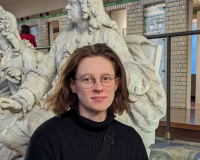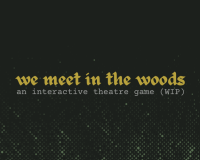Posted on Thu 14 Mar 2024
on pushing yourself
some thoughts on scale and process
Posted by

Elinor Lower
Eli is one of the Studio's 2024 Winter Residency Artists, exploring how we are hyper-individualised as workers, citizens and humans through 'we meet in the woods', a place-based, multiplayer theatrical game.Project

we meet in the woods
an interactive theatre game exploring systems of co-creation and consensus building, beginning in a forest.We’re midway through the second month of the 2024 Winter Residencies. I’ve been spending a lot of time (too much?) in the PM Studio. Scribbling on post-it notes, pacing around, stretching the outer limits of my imagination, drawing a lot of diagrams. Changing my mind about everything every five seconds. Steadily making progress.
It’s tricky, I think, when you’re at the sticky, awkward first stages of an idea — an idea that (when you think about it) is HUGE. Is REALLY REALLY MASSIVE. (IS MAYBE SOMETHING YOU’RE GOING TO HAVE TO TEACH YOURSELF A LOT OF NEW SKILLS TO BE ABLE TO PULL OFF.) And that massive-ness is exciting, but you’re not there yet! You’re still bambi-legged, slipping out onto the frozen lake. And you have to take baby steps.
Scaling down the idea and managing your expectations becomes important.
In exploring we meet in the woods, the place-based game/experience that I’m developing, controlling the scale of my ambition has been vital. I know that I want to explore branching narratives and play with radio transmission, compose music and construct an intricate web of motion- and button-triggered elements that tune participants right into their immediate environment, and co-ordinate the journeys of 2, 4, 8, 16 simultaneous experiences. But I can’t do all of that at the same time. And some of those things can’t happen until I’ve finished others.
Which is hard because my brain only has two speeds and both of them are over 900mph.
But you get there! Eventually! And I’ve excised a small part of it to examine how we get audiences on board with taking part in something like this, and how we treat them with care when they get there. That’s what’s fundamental; the basis on which everything else must rest.
As someone who has made a lot of co-created, devised and participatory work, I’m interested in how we can build tenderness into the things we create so that they are resolutely designed to account for the audience that will experience them. That isn’t to say I want to delete the crunchy parts. I think what I mean by “tenderness” is zooming into that word: tender. Meaning soft and gentle, but also raw and exposed. The feeling that makes you suck in a hissed intake of breath when someone brushes against a freshly scraped knee. That sharp awareness of vulnerability it invites.
Since, in its current form, WMITW is designed as an experience guided by a narrative, but played out by a lone player in a way that hopefully feels at least partially self-directed, some questions that have emerged include:
- what's the least information with which someone could successfully engage with WMITW's "world"?
- how do you create something that feels kind and welcoming if there's no-one there in-person to facilitate it?
- what are the ethics of instruction?
- if a story is designed by someone (me), to what extent can it enable 'free-thinking' from its players? does that matter?
- what structure/parameters might support a player to feel the most free to explore/experiment?
Alongside all that, because actually despite my efforts to work in a straight line everything is emerging from the primordial soup simultaneously, I’ve built some fun tactile things. And spent so much time trying to understand why the things I’ve built don’t work. And sighing deep sighs of relief when the LED finally blinks on in the way it’s meant to.
And I’ve read a lot of books. And have dozens more to get through. Because this residency, this idea, is probably the furthest I’ve pushed myself outside of my comfort zone in a long time, and there are a lot of things I need to know a lot more about if this thing’s ever going to come together.
So, I’ll leave you with my reading list, because that’s the sort of thing I like in a blog post.
The Democracy Project, David Graeber
we were promised honey!, Sam Ward
The Hidden Life of Trees, Peter Wohlleben
The Overstory, Richard Powers
Immersive Theatres: Intimacy and Immediacy in Contemporary Performance, Josephine Machon
How To Do Nothing: Resisting The Attention Economy, Jenny Odell
The Art of Gathering: How We Meet and Why It Matters, Priya Parker
Creating Worlds, Jason Warren
Kobold Guides to Worldbuilding & Game Design
Second Person: Roleplaying and Story in Games and Playable Media
Meander Spiral Explode: Design and Pattern in Narrative, Jane Alison
Other Minds: The Octopus and the Evolution of Intelligent Life, Peter Godfrey-Smith
and a load of others, I’m sure.